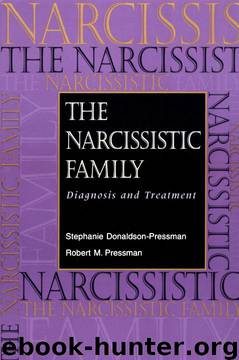The Narcissistic Family: Diagnosis and Treatment by Stephanie Donaldson-Pressman;Robert M. Pressman

Author:Stephanie Donaldson-Pressman;Robert M. Pressman
Language: eng
Format: mobi
Published: 2009-05-04T20:05:00+00:00
Decision Making and
Deferment of Gratification
dults who have been raised in either overtly or covertly narcissistic family systems have learned not to trust. They may have a series of behaviors that they label as trust or trustingincluding injudicious self-disclosure, immediate and total belief in what another person tells them without the history to support it, or the naive belief that another person may be able to meet all their needs or solve all their problems-but when these relationships fall apart (as they invariably do), they revert to their worldview: "I can't trust anyone, because whenever I do, I get hurt."
Genuine trust is something that is learned in childhood. The narcissistic family, of course, is not a good place to learn trust, as children are not given the opportunity to learn about their feelings and needs in any consistent way and so cannot learn to be trusting of themselves-of their validity, perceptions, character, uniqueness, abilities, or worth. Without essential trust (trust in oneself), decision making that involves the ability to do long-range planning (which is based on postponement of gratification) becomes difficult. To work toward a goal without some immediate payback means that one has faith in the eventual outcome: trust in oneself to make it happen, and trust in others not to "change the rules" or present insurmountable obstacles.
In the narcissistic family, things happen more or less on the whims of the parent(s). Promises are made, but they may not be kept. Further, it is difficult for the child to make any predictions about whether a particular promise will be kept, because he or she does not understand that the basis for parental decision making is meeting the needs of the parent(s). Consider the example below:
Billy: Dad! Mom! I've got my baseball schedule. Can you guys come to all my games this year?
Dad: Sure, sport. Wouldn't miss the chance to see my boy be a star!
Billy: Dad, I'm not exactly a star. I play outfield.
Dad: Well, you work hard, and soon you'll be the pitcher.
Billy: Did you mean what you said about coming to all the games? Really?
Dad: Of course I did. Whenever I can.
Billy: Mom, too?
Dad: Jeez, Billy ... I'd said we'd be there.
The promise is that Dad and Mom will go to all of Billy's baseball games. This promise is repeated every game for five games; two games it is kept, the other three it is not. Billy cannot predict if his parents will actually be at any given game, because they always promise to be there but often are not. He does not understand why they come or do not come. It does not seem to relate to the weather, as one of the times they showed up it was sunny, but the other time it was raining. It does not relate to sickness either, as the sunny time Mom had a bad cold but came anyway. Billy learns from this that he cannot trust long-range plans, his parents' word, his ability to positively influence his environment and therefore himself.
Download
This site does not store any files on its server. We only index and link to content provided by other sites. Please contact the content providers to delete copyright contents if any and email us, we'll remove relevant links or contents immediately.
Periodization Training for Sports by Tudor Bompa(8254)
Why We Sleep: Unlocking the Power of Sleep and Dreams by Matthew Walker(6706)
Paper Towns by Green John(5179)
The Immortal Life of Henrietta Lacks by Rebecca Skloot(4579)
The Sports Rules Book by Human Kinetics(4379)
Dynamic Alignment Through Imagery by Eric Franklin(4208)
ACSM's Complete Guide to Fitness & Health by ACSM(4057)
Kaplan MCAT Organic Chemistry Review: Created for MCAT 2015 (Kaplan Test Prep) by Kaplan(4008)
Introduction to Kinesiology by Shirl J. Hoffman(3766)
Livewired by David Eagleman(3765)
The Death of the Heart by Elizabeth Bowen(3610)
The River of Consciousness by Oliver Sacks(3599)
Alchemy and Alchemists by C. J. S. Thompson(3516)
Bad Pharma by Ben Goldacre(3422)
Descartes' Error by Antonio Damasio(3271)
The Emperor of All Maladies: A Biography of Cancer by Siddhartha Mukherjee(3155)
The Gene: An Intimate History by Siddhartha Mukherjee(3094)
The Fate of Rome: Climate, Disease, and the End of an Empire (The Princeton History of the Ancient World) by Kyle Harper(3055)
Kaplan MCAT Behavioral Sciences Review: Created for MCAT 2015 (Kaplan Test Prep) by Kaplan(2984)
